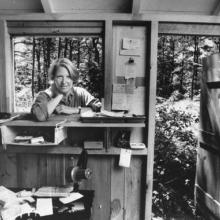seamus heaney

Mikhail Zihranichny / Shutterstock
SHORTLY BEFORE Irish poet Seamus Heaney died in 2013, he texted these last words to his wife, Marie: Noli timere. Be not afraid.
I’m not sure if Heaney, who was described by Robert Lowell as “the most important Irish poet since Yeats,” knew this was his last text and final words, but I suspect he did.
It’s a sad commentary that when the Twitterverse got hold of Heaney’s message, no one could figure out what it meant or where it was from. Many did not recognize the angels’ message to Zechariah (Luke 1:13) or Mary (Luke 1:30) or the shepherds (Luke 2:10) or Joseph in a dream (Matthew 1:20): Be not afraid.
Heaney understood words as “bearers of history and mystery.” As a distinguished translator of poetry from Greek, Latin, Italian, Irish, Anglo-Saxon, and Middle Scots, he had plenty of languages to choose from. But he chose St. Jerome’s fourth century vulgate version of the Bible. He chose the language of the angels.
One of my favorite stories is about the interview I wanted most, but didn’t get.
It was 2005 and I had just signed a contract to write what would be my first book — a collection of profiles of mostly well-known people about their spiritual lives. Artists. Writers. Thinkers. Scientists. The odd rock star.
Sitting in my publisher’s office, she asked me to dream out loud: If I could interview anyone for the project, who was No. 1 on my wish list?
I answered without hesitation: Seamus Heaney.
When Sojourners CEO Jim Wallis departed on his three-month sabbatical at the beginning of January, I sent him a list of books, films and music that I thought would nourish his mind and spirit in, perhaps, different ways than the media he normally consumes do.
Jim's sabbatical — a true Sabbath in the literal sense — is designed to be a time of rest and, more importantly, rejuvenation. It will also be a creative time when he will be working on a new book.
Jim is a creative. A writer. A visionary. He regularly digs deep into his heart and soul, breaks himself open and pours out his passion, hope and faith for the edification of others. If creatives aren't diligent, though, we can work ourselves into the ground. Our wells can run dry.
In sending Jim this list of what I like to think of as "soul food," I hoped to inspire his imagination and give him new fuel for the fire, if you will.
![Irish poet Seamus Heaney By Sean O'Connor [Public domain], via Wikimedia Commons Irish poet Seamus Heaney By Sean O'Connor [Public domain], via Wikimedia Commons](https://sojo.net/sites/default/files/styles/medium_square/public/blog/Seamus_Heaney.jpg?itok=o2jgLyt5)
